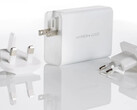Update: The resolution in question has now passed, with 582 votes in its favor to 40 against. The European Commission will now evaluate various policy options so as to implement the new legislative decision. This process should start from the third quarter of 2020.
Members of the European Parliament (MEPs) are to vote on a new motion to make the adoption of a single, standard mobile-device charger across the political bloc in question. Should it be carried, it could result in the conversion of the 2014 Radio Equipment Directive into a law. This would, for example, prevent Apple from shipping future iPhones with a Lightning port as usual.
This represents a potential blow to the Cupertino-based company's profit margin: quite apart from selling its own proprietary cables for these phones, it also regularly makes a mint from the MFi certifications that are required by third-party manufacturers who want to make accessories compatible with the standard.
The EU's representative body, on the other hand, considers concerns such as these an inadequate trade-off for the environmental impact discarded chargers can have. They can be responsible for 51000 tons of e-waste per year or more, according to recent estimates.
The Parliament's statement did not mention which "charger" would be made constant across the Union, however, although USB type C is a prime candidate. It is capable of powering devices at rates of up to 100 watts (W) at present, and also improves in terms of data-transfer standards by the generation. To date, the vote on this change to the EU's legislation is yet to be scheduled.























